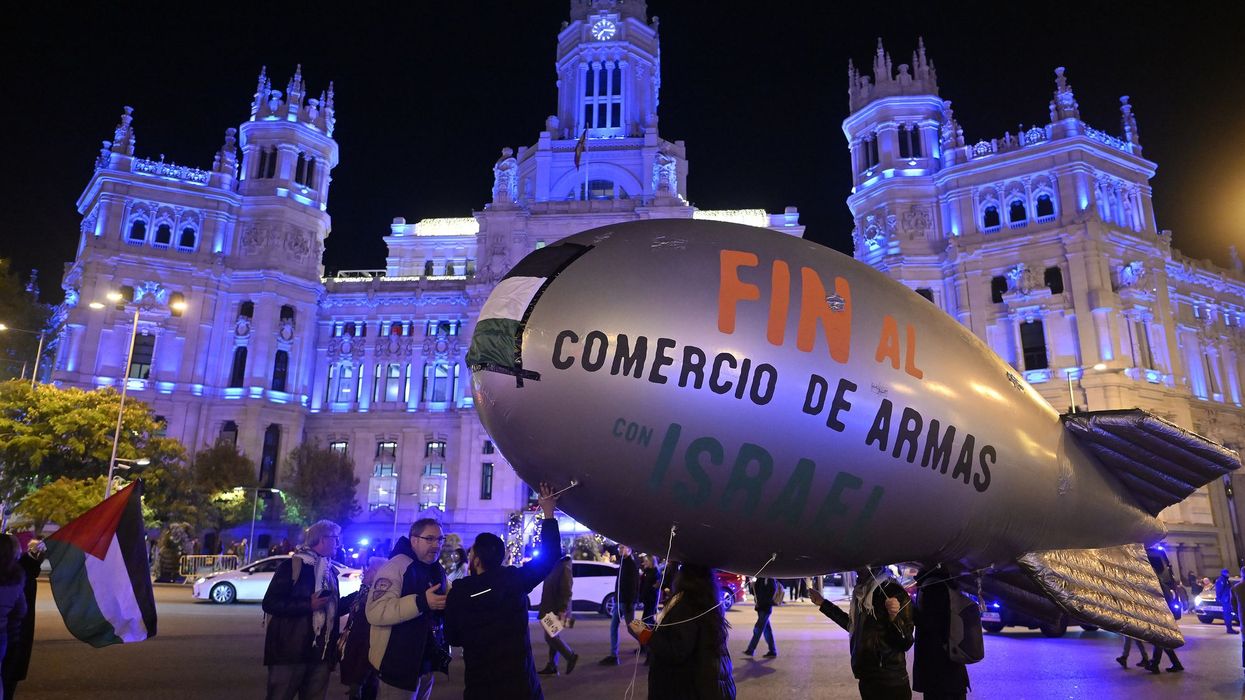November, 24 2008, 01:58pm EDT

For Immediate Release
Contact:
Charlotte
Kates, NLG Middle East Subcommittee,
charlotte.kates@gmail.com,
732-207-7215
National Lawyers Guild Calls for Freedom for Ahmad Sa'Adat and All Palestinian Political Prisoners
WASHINGTON
The National Lawyers Guild calls for the freedom of Ahmad Sa'adat and all Palestinian political prisoners on the occasion of the November 25, 2008 meeting of the Israeli military trial against Sa'adat.
Ahmad Sa'adat, the General Secretary of the Popular Front for the Liberation of Palestine, has been imprisoned by Israel for over two and one-half years, after being abducted from the Palestinian Authority prison at Jericho on March 14, 2006 during a 10-hour siege by the Israeli military.
Sa'adat is currently facing a military trial for 19 political offenses. Meetings of the military court on these charges have been repeatedly delayed and postponed; it often meets for one day and does not reconvene for periods of up to three months before continuing.
On November 25, 2008, Sa'adat faces a hearing of the military court in his case. The prosecutor has stated that there is no further evidence against Sa'adat, and his case is expected to be referred to sentencing. Sa'adat has refused to recognize the legitimacy of Israeli military courts to try him or any other Palestinian political prisoner. He has refused to speak in court except to make general statements to the Palestinian people calling for national unity and upholding Palestinian rights.
Israel currently holds over 11,000 Palestinian men, women and children as political prisoners. One out of every four Palestinians living in the West Bank and Gaza has been subject to political arrest or detention, including 40% of Palestinian men from the West Bank and Gaza. Sa'adat is one of a number of Palestinian national leaders, including Marwan Barghouti, Abdelaziz Dweik, Speaker of the Palestinian Legislative Council, and 39 other members of the Palestinian Legislative Council, currently imprisoned by Israel.
Over half of Palestinian prisoners have never been tried. Those Palestinian prisoners and detainees who are tried are brought before an Israeli military court, which is presided over by three judges, only one of which is required to have any legal training. These courts serve as a function of the illegal military occupation, and thus can never provide a legitimate or fair trial to Palestinian political prisoners.
On the occasion of the November 25 hearing, the National Lawyers Guild reiterates its call for the immediate freedom of Ahmad Sa'adat and all Palestinian political prisoners and detainees.
The National Lawyers Guild supports the call of the Campaign to Free Ahmad Sa'adat for actions, events, and statements in support of Sa'adat and Palestinian political prisoners.
The National Lawyers Guild (NLG) works to promote human rights and the rights of ecosystems over property interests. It was founded in 1937 as the first national, racially-integrated bar association in the U.S.
(212) 679-5100LATEST NEWS
Israel Named Leading Killer of Journalists in 2025 for Third Straight Year
Nearly half of the worldwide reporters who lost their lives on the job this year were killed by the Israel Defense Forces in Gaza, according to Reporters Without Borders.
Dec 09, 2025
The report released Tuesday by the global press freedom group Reporters Without Borders provides an accounting of the killing of dozens of journalists across the globe in 2025, but nearly half of the people whose deaths are included were killed by the same group: the Israel Defense Forces.
For the third year running, as Israel's attacks on Gaza and the West Bank continue despite a ceasefire agreement reached in October in Gaza, the country was named as the top killer of journalists and media workers, having killed at least 29 Palestinian reporters this year.
Out of 67 reporters killed while doing their jobs in the past year, 43% were killed in Gaza by the IDF—called "the worst enemy of journalists" in 2025.
"Journalists do not just die—they are killed," said Reporters Without Borders, also known by its French name, Reporters sans Frontières (RSF), as it released its 2025 Round-up. "The number of murdered journalists has risen again, due to the criminal practices of military groups—both regular and paramilitary—and organized crime."
In 2025, the number of journalists killed on the job rose by one compared to 2024.
#RSFRoundUp 2025: Journalists don't die, they are killed. In 2025, the number of journalists killed rose once more.Let's continue to count, name, denounce, investigate, and ensure that justice is done. Impunity must never prevail.Watch our #RSFRoundUp2025 ⬇️
[image or embed]
— RSF (@rsf.org) December 9, 2025 at 3:10 AM
The government of Israeli Prime Minister Benjamin Netanyahu was named in RSF's report as one of the world's "Press Freedom Predators," along with Myanmar's State Security and Peace Commission—the country's de facto military government—and the Jalisco New Generation Cartel in Mexico, where at least three journalists were killed this year while they were covering drug trafficking in areas where the cartel is influential.
In the case of Netanyahu's government, reads the report "the Israeli army has carried out a massacre—unprecedented in recent
history—of the Palestinian press. To justify its crimes, the Israeli military has mounted a global propaganda campaign to spread baseless accusations that portray Palestinian journalists as terrorists."
The 29 reporters killed in Gaza this year are among more than 200 journalists killed by the IDF since it began its assault on the exclave in October 2023 in retaliation for a Hamas-led attack. According to RSF, 65 of those killed were "murdered due to their profession," and others were killed in military attacks.
The report notes the "particularly harrowing case" of two strikes that targeted a building in the al-Nasser medical complex which was "known to house a workspace for journalists" on August 25.
Reuters photographer Hossam al-Masri was killed in the first strike, and a second strike eight minutes later killed Mariam Abu Dagga of the Independent Arabia and the Associated Press, freelancer Moaz Abu Taha, and Al Jazeera photograher Mohamad Salama.
The journalists had been covering rescue operations and the impacts of other airstrikes. They were killed two weeks after an IDF strike killed five other Al Jazeera reporters and an independent journalist while they were in their tent outside al-Shifa Hospital in Gaza City.
Israel claimed one of the reporters, Anas al-Sharif, was "the head of a Hamas terrorist cell"—an allegation that was denied in independent assessments by United Nations experts, the New York-based Committee to Protect Journalists, and RSF.
The killing of the reporters and dozens of others around the world, said RSF director general Thibaut Bruttin on Tuesday, "is where the hatred of journalists leads!"
"They weren’t collateral victims," said Bruttin. "They were killed, targeted for their work. It is perfectly legitimate to criticize the media—criticism should serve as a catalyst for change that ensures the survival of the free press, a public good. But it must never descend into hatred of journalists, which is largely born out of—or deliberately stoked by—the tactics of armed forces and criminal organizations."
Palestine was named as by far the most dangerous place in the world for journalists this year, while Mexico was identified as the second-most dangerous, with nine reporters killed despite "commitments" President Claudia Sheinbaum made to RSF.
The journalists "covered local news, exposed organized crime and its links to politicians, and had received explicit death threats," reported RSF. "One of them, Calletano de Jesus Guerrero, was even under government protection when he was murdered."
Bruttin warned that "the failure of international organizations that are no longer able to ensure journalists’ right to protection in armed conflicts is the consequence of a global decline in the courage of governments, which should be implementing protective public policies."
Three journalists were killed in Ukraine in one month, targeted by Russian drone attacks even as they wore helmets and bulletproof vests that clearly identified them as members of the press. Two reporters were killed in Bangladesh in apparent retaliation for their reporting on crimes.
The report also notes that 503 journalists are detained around the world, with Israel the second-biggest jailer of foreign journalists after Russia. Twenty Palestinian reporters are currently detained by Israel, including 16 who were arrested over the past two years in the West Bank and Gaza. Just three—Alaa al-Sarraj, Emad Zakaria Badr al-Ifranji, and Shady Abu Sedo—where released as part of the ceasefire agreement in October after having been "unlawfully arrested by Israeli forces" in Gaza.
"It is our responsibility to stand alongside those who uphold our collective right to reliable information. We owe them that," wrote Bruttin. "As key witnesses to history, journalists have gradually become collateral victims, inconvenient observers, bargaining chips, pawns in diplomatic games, men and women to be eliminated. Let us be wary of false notions about reporters: No one gives their life for journalism—it is taken from them."
Keep ReadingShow Less
Military Budget Bill Would Ramp Up Israel Aid to Fill In 'Gaps' When Other Countries Impose Embargoes Over Genocide
The House Armed Services Committee said in September that the measure "combats antisemitism."
Dec 09, 2025
A little-reported provision of the latest military spending bill would direct the US to create a plan to fill the "gaps" for Israel whenever other nations cut off arms shipments in response to its acts of genocide in Gaza.
As Prem Thakker reported Monday for Zeteo, the measure is "buried" more than 1,000 pages into the more than 3,000-page National Defense Authorization Act (NDAA), which is considered by lawmakers to be “must-pass" legislation and contains a record $901 billion in total spending.
Republicans are shepherding the bill through the US House of Representatives, where—as is the case with most NDAAs—it is expected to pass on Wednesday with Democratic support, even as some conservative budget hardliners refuse to back it, primarily over its $400 million in military assistance to Ukraine.
Since the genocide began following Hamas' attack on October 7, 2023, the US has provided more than $21.7 billion to Israel, including hundreds of millions that have been supplied through NDAAs.
The new NDAA includes at least another $650 million to Israel, an increase of $45 million from the previous one, even though this is the first such bill to be introduced since the "ceasefire" that went into effect in October. This aid from the Pentagon comes on top of the $3.3 billion already provided through the State Department budget.
But this NDAA also contains an unprecedented measure. It calls for the “continual assessment of [the] impact of international state arms embargoes on Israel and actions to address defense capability gaps."
The NDAA directs Secretary of Defense Pete Hegseth, Secretary of State Marco Rubio, and Director of National Intelligence Tulsi Gabbard to assess “the scope, nature, and impact on Israel’s defense capabilities of current and emerging arms embargoes, sanctions, restrictions, or limitations imposed by foreign countries or by international organizations,” and “the resulting gaps or vulnerabilities in Israel’s security posture.”
As Drop Site News explains, "this means the US would explicitly use federal law to step in and supply weapons to Israel whenever other countries cut off arms to halt Israel’s ongoing violations across the region."
"The point of this assistance, to be clear, is to make up for any identified insufficiencies Israel may have due to other countries' embargoing it as a result of its ongoing genocide in Palestine," Thakker wrote.
A similar provision appeared in a September version of the NDAA, which the House Armed Services Committee praised because it supposedly “combats antisemitism"—explicitly conflating a bias against Jewish people with weapons embargoes that countries have imposed to stop Israel from continuing its routine, documented human rights violations in Gaza.
Among the nations that have cut off weapons sales to Israel are Japan, Canada, France, Italy, and Spain. Meanwhile, other major backers, such as the United Kingdom and Germany, have imposed partial freezes on certain weaponry.
While official estimates from the Gaza Ministry of Health place the number of dead from Israel's military campaign at over 70,000, with more than 170,000 wounded, an independent assessment last month from the Max Planck Institute for Demographic Research in Germany and the Center for Demographic Studies in Spain found that the death toll “likely exceeds 100,000." This finding mirrored several other studies that have projected the true death toll to be much higher than what official estimates show.
Embargoes against Israel have been called for by a group of experts mandated by the United Nations Human Rights Council, including Francesca Albanese, the UN Special Rapporteur on the occupied Palestinian territories. Meanwhile, numerous human rights organizations, including the leading Israeli group B’Tselem, have said Israel’s campaign in Gaza has amounted to genocide.
Keep ReadingShow Less
‘Who Will Be in Charge?’ Sanders Warns of AI Future Dominated by Handful of Billionaires
"Are we comfortable with seeing these enormously wealthy and powerful men shape the future of humanity without any democratic input or oversight?" asked Sen. Bernie Sanders.
Dec 09, 2025
US Sen. Bernie Sanders said Monday that policymakers in the United States and around the world are at a critical juncture where they must decide whether artificial intelligence will be controlled and exploited by the ultra-wealthy—or utilized for the benefit of all humanity.
In a speech on the floor of the US Senate, Sanders (I-Vt.) said the key question is, "Who will be in charge of the transformation into an AI world?"
"Currently, a handful of the wealthiest people on Earth—people like Elon Musk, Jeff Bezos, Bill Gates, Mark Zuckerberg, Peter Thiel, and others—and others are investing many, many hundreds of billions of dollars in developing and implementing AI and robotics," the senator said. "Are we comfortable with seeing these enormously wealthy and powerful men shape the future of humanity without any democratic input or oversight?"
Watch the full speech:
Sanders noted that US President Donald Trump "is strongly supporting" billionaire dominance of burgeoning AI technology, including with his plan to sign an executive order aimed at blocking state-level regulations of the artificial intelligence industry.
"Does this elite group of some of the most powerful people on Earth believe that they have the divine right to rule?" the senator asked.
Sanders also emphasized the potentially catastrophic impact of AI technology on workers, as Amazon and other corporate giants seek to replace as many jobs as possible with robots. In October, Sanders released a report estimating that advances in AI technology could supplant nearly 100 million US jobs over the next decade, including 89% of fast food workers and 40% of registered nurses.
"If AI and robotics eliminate millions of jobs and create massive unemployment, how will people survive if they have no income? How do they feed their families, pay for housing, pay for healthcare?" Sanders asked. "That might be an issue that we should be talking about, like, yesterday."
In recent weeks, Sanders has made burgeoning AI technology and its concentration in the hands of a few powerful individuals and corporations a major focus, holding an event with computer scientist Geoffrey Hinton—who is known as the "godfather of AI"—and warning about the promise and peril of artificial intelligence in the pages of major newspapers.
"AI and robotics are revolutionary technologies that will bring about an unprecedented transformation of society," Sanders wrote in a Guardian column last week. "Will these changes be positive and improve life for ordinary Americans? Or will they be disastrous? Congress must act now."
Keep ReadingShow Less
Most Popular


